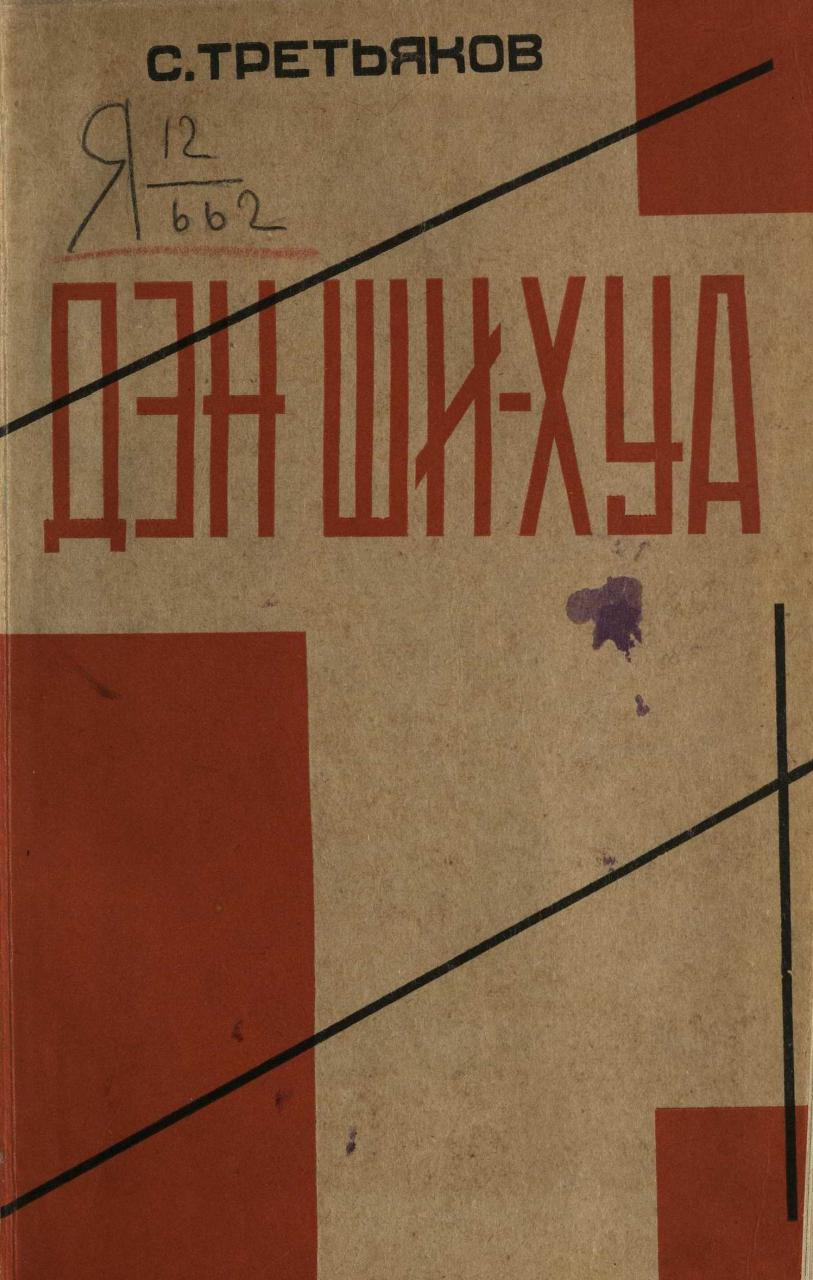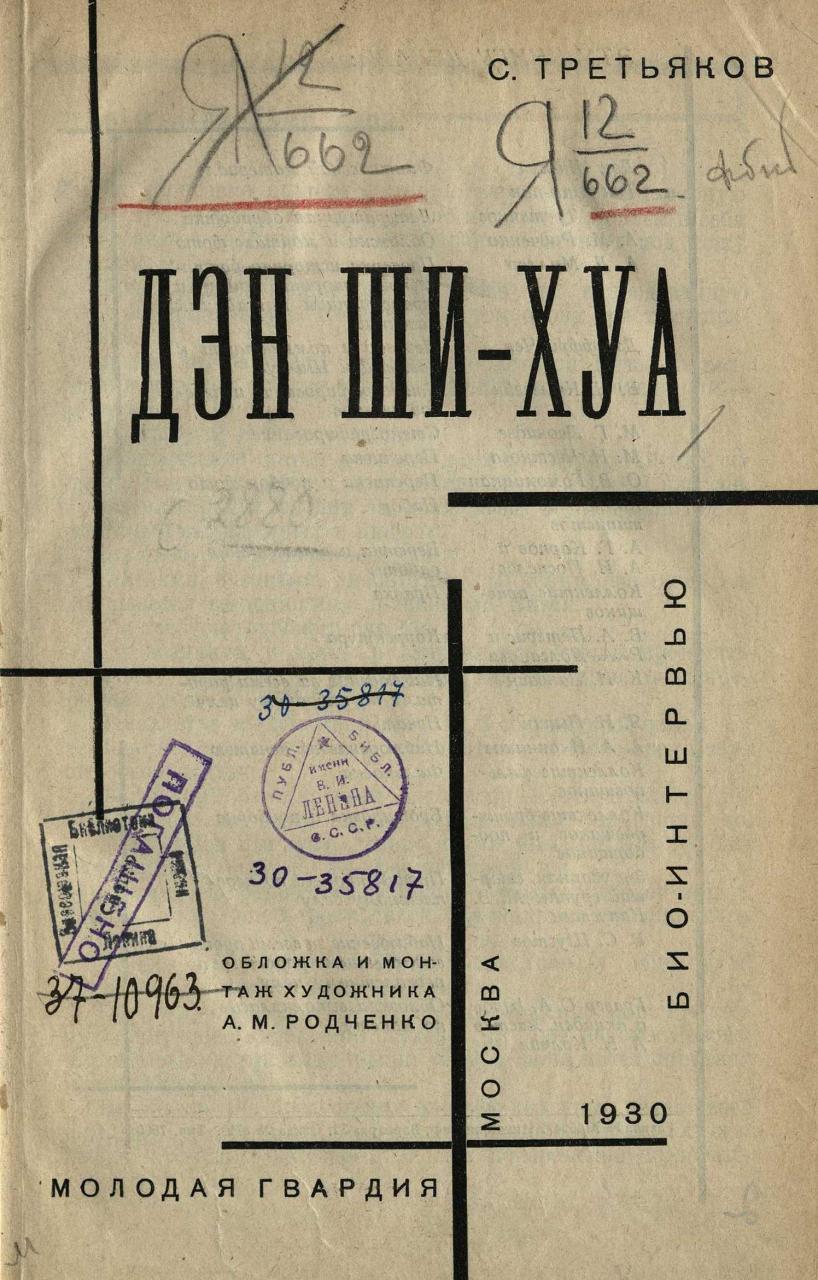Deng Shi-hua is a story written by S. M. Tretyakov in 1929. The story grew out of the writer's conversations with one of his students in the Russian section of Peking University, where Tretyakov was a professor. This is 26 years of authentic human life, a biography told by a Chinese student, Deng Shi-Hua, typical of Chinese youth in the 1920s.
Tretyakov S. M. Dan Shi-hua: Bio-interview / Cover and editing by artist A. M. Rodchenko. – Moscow, 1930


Dan Shi-hua: Bio-interview / S. Tretyakov; Cover and editing by artist A. M. Rodchenko. – Moscow: Young Guard, 1930. – 392 p., ill.
Sergei Mikhailovich Tretyakov (1892-1937) – Russian publicist, playwright, futurist poet. In 1915 he graduated from the law faculty of Moscow University. In 1919-1922. lived and worked in Vladivostok, Beijing, Harbin, Chita. Member of the Civil War in the Far East.
S. M. Tretyakov began to print in 1913 – he was a member of the Moscow group of ego-futurists Mezzanine of Poetry, in Vladivostok he was a member of the group of futurists Creativity, collaborated in the newspapers Red Banner, Far Eastern Review, Far Eastern Tribune , magazines Creativity, Window, Nedelya, etc. The first book of his poems Iron Pause was published in 1919 in Vladivostok. In 1922, poetry collections Yasnysh (1922) and Voucher (1921) were published in Chita.
In 1922, Tretyakov came to Moscow, worked in Rabfakov’s literary associations, in GosTeam, on the stage of which V. Meyerhold staged his play “Roar, China!”, And in the First Workers’ Theater of Proletkult, in which S. M. Eisenstein staged his plays . In 1924-1925. lectured on Russian literature at Peking University. In 1925, Tretyakov was chairman of the artistic council of the first State Film Factory. One of the founders and leaders of the LEF group, he edited the Novy LEF magazine after V. Mayakovsky left it. In 1930-1931. Tretyakov visited Germany, Denmark and Austria, established close contacts with many cultural figures, including B. Brecht – Tretyakov was one of the first translators of B. Brecht into Russian. In 1937, in Moscow, S. M. Tretyakov was arrested and shot.
Deng Shi-hua is a story written by S. M. Tretyakov in 1929. The story grew out of the writer's conversations with one of his students in the Russian section of Peking University, where Tretyakov was a professor. This is 26 years of authentic human life, a biography told by a Chinese student, Deng Shi-Hua, typical of Chinese youth in the 1920s.
THE FIRST FEW WORDS
We, on the black earth of our October, cultivating the exorbitant Chinese revolution, feverishly and legally drive any knowledge about China into ourselves, just as an anemic man drives syringes of arsenic under his skin.
Our previous knowledge of China is like a mutilated hand. It must first be broken, and then spliced again correctly.
The time of literary alchemy, according to which China in the collection of peoples is a mysterious and indestructible stone was passed.
Political articles and schemes give the algebra of Chinese events. The names are erased, people spil into the amoebas of classes, and the algebraic's eye monitors the movement and gluttony of these amoebas, expressed in numbers.
So the thought arose and entrenched in me: to pave the wood of the new China with a biography, like a beetle-a-tape rises a beam.
The present today's writer is the “discoverer of the new material”, a careful, not distorting his former.
To see in detail your life is the abdication of a high brand. It is given a large training. Journal journalism and newspaper reporting is the best school.
He enthusiastically met my proposal to write an exact biography of a Chinese student. But alas, the first words that he uttered were: Our family is intelligent and petty -bourgeois.
He noblely gave me magnificent bowels of his memory. I rummaged in him like a Shakhtar, probing, exploding, riding, exhausting, exhausting. I was alternately an investigator, a confessor, a questionnaire, an interviewer, an interlocutor, a psycho analyst.
Everything that I issued, I find it difficult to name otherwise than an interview. But the interview covers the life of one person, so I add a “bio” particle to him.
Dan Shi-Hua was my student at the Russian section of the National University in Beijing in the pre-heating years of 1924-1925. From the wilderness of the native and beloved Sichuan province, hiding the seventy million of its inhabitants fruitful soil, the boy Shi-hua through the compulsion lazy Beijing reached Moscow. He measured the wolf and Ilyinka panels with his steps, leafed through the Pravda pages and once every two months he traveled on tram No. 6 in Cherkizovo, where behind a collapsed courtyard in real Chinese Kharchovka, bamboo cups brought to Moscow were supplied by some miracle. He was not a communist. The homindanism of his father was transmitted to him as if by inheritance. Poisoned by the sweets of the arts and conceit of the intellectual, he failed to feel himself and his owl estate of the Schensha, owners of knowledge, lands and positions, the servant of the rise of the masses. He answered the betrayal of the Gomindan generals with painful indignation, but did not leave Homindan. In his generation, the social energy of the leading classes of old China clearly breaks. The leaders of the new China will come from the depths of the new classes, those from which the Semlinity of the environment taught Dan Shi-Hua to shy away. He left Moscow to China as imperceptibly and silently as he silently entered the Beijing into my room, gently stepping with cloth shoes and carrying his cone -shaped, easily flowing robe on his protruding shoulders and pressed chest.
The Chinese-communists, having listened to excerpts from the bio-interview, said:-But this is our childhood, our school, our life,-the biography of Shi-Hua is so typical for today's Chinese young intelligentsia, giving both fearless Komsomol members, and prudent general writers.
This book is only 26 years of genuine human life.She should end with the words: Continuation should.


